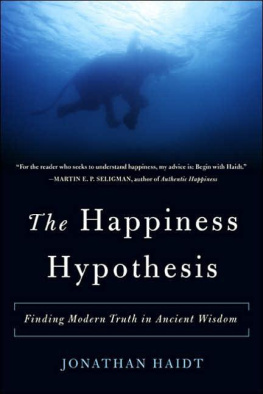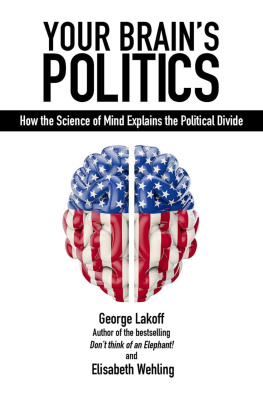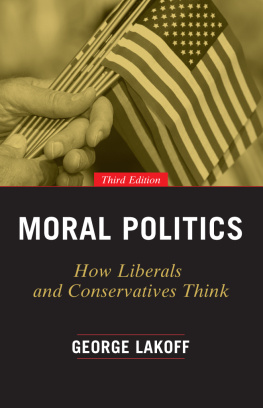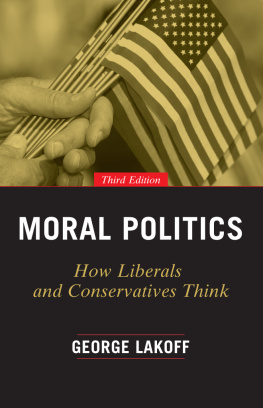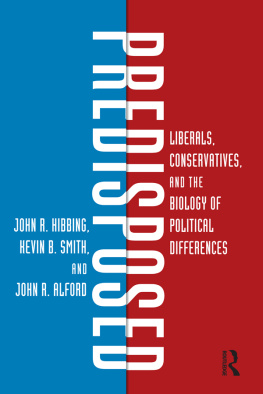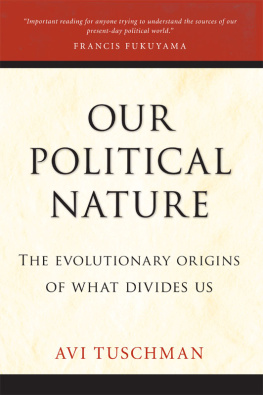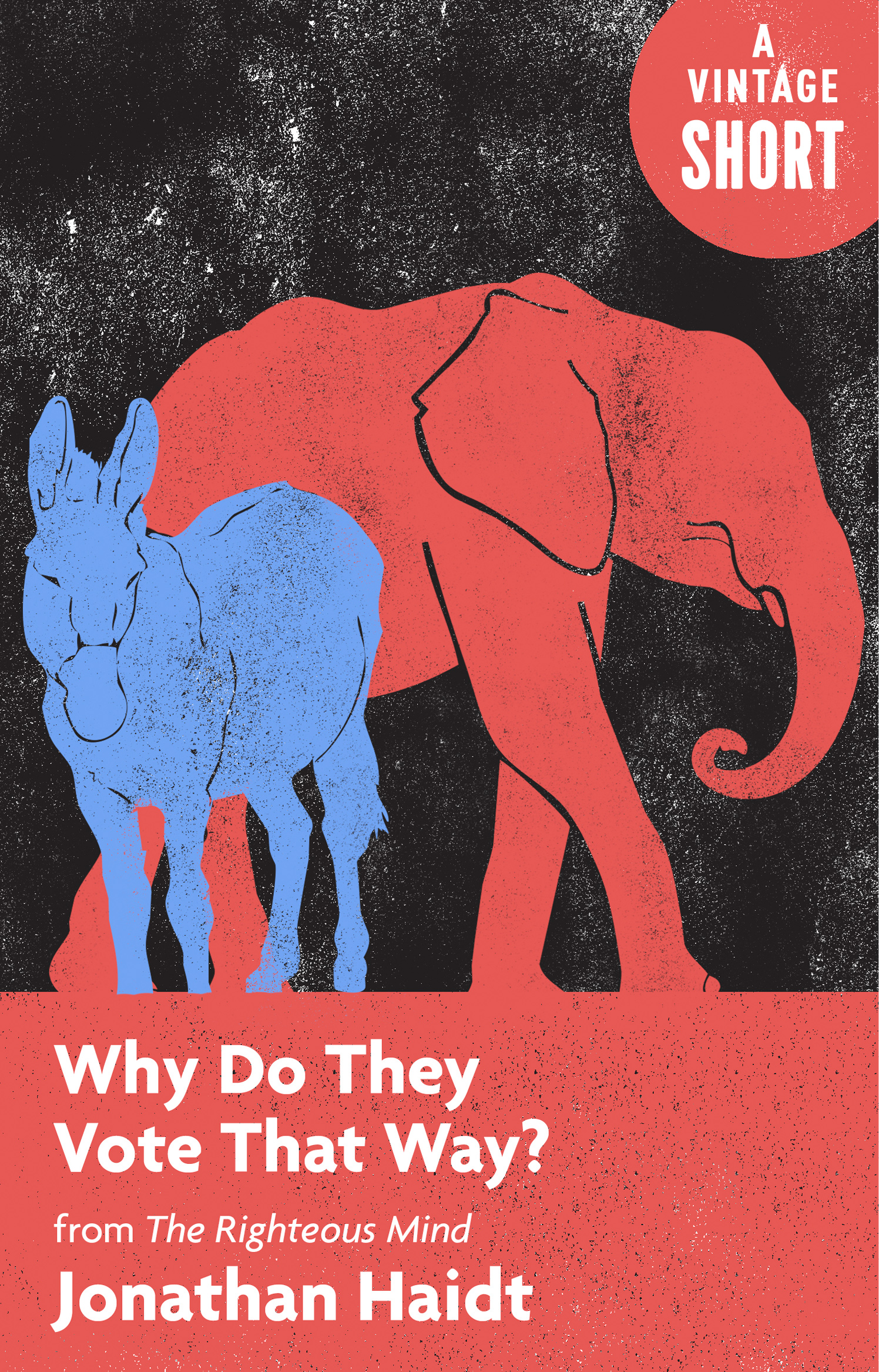All rights reserved. Published in the United States by Vintage Books, a division of Penguin Random House LLC, New York, and in Canada by Random House of Canada, a division of Penguin Random House Canada Limited, Toronto. Portions originally published in hardcover as a part of The Righteous Mind in the United States by Pantheon Books, a division of Random House, Inc., in 2012.
Vintage and colophon are registered trademarks of Penguin Random House LLC.
Cover illustrations: Donkey courtesy of Mariana Ruiz Villarreal; elephant/www.publicdomainpictures.net
Preface to the Vintage Short Edition 2018
Do you sometimes wonder why so many of your fellow citizens vote the way they do, with so little regard for obvious facts or basic moral values? I used to be consumed by that question. When I first began to study political psychology, I desperately wanted to understand why roughly half of American voters voted for Republicans. I was a partisan Democrat back thennow I am a non-partisan centristand the Democrats had lost two presidential elections in a row that I thought they should have won.
I am a social psychologist who studies how morality varies across cultures. In the course of my research in Brazil, India, and the United States, I had developed a theory, called moral foundations theory, to explain why people in different societies and different social classes often disagree about what was right and wrong. By 2005, the American culture war (disputes over social issues such as abortion, flag burning, and gay marriage) got so intense that it looked as though Democrats and Republicans were living in different countries, with different sets of facts, different fears, and even a different Constitution.
So, in 2005, I set out to learn as much as I could about political psychology, and about conservatives in particularabout whom I knew very little. I began watching TV programs on Fox News, and I subscribed to the conservative magazine National Review, along with my usual diet of more left-leaning sources. I began teaching a graduate seminar class on political psychology at the University of Virginia, where I was a professor of psychology. And I began talking with more people about politicsnot to argue or persuade, but to hear the kinds of moral words and concepts that they reached for when they talked about current events.
Over the next few years, I learned two lessons that have guided my research ever since:
1) All political movements and parties are morally motivated. (That doesnt mean that they are all morally right or equally right; it just means that their motives are, in part, to improve society as they understand it.)
2) You cant understand complicated social or political issues until you have listened to people who do not share your own preconceptions. (Each side or team has pre-structured the issue for its members in ways that guarantee that they will be blind to some aspects of the problem.)
Those two insights motivated me to write The Righteous Mind and to help all sides understand each other better and have more productive, respectful, and civil disagreements. The short piece you are now reading is an excerpt from The Righteous Mindit was chapter 8, originally titled The Conservative Advantage. (The word advantage was meant to connote that conservatives have an advantage in making powerful moral appeals, as youll see later.) Two key principles of moral psychology inform the arguments here.
Principle #1: Intuitions come first, strategic reasoning comes second.
When I began graduate school, in 1987, psychologists who studied morality generally focused on moral reasoning. They posed dilemmas for children and adolescents, such as whether it would be right for a man to steal an expensive medicine if it was the only way he could save his wifes life. The researchers didnt really care if the answer was yes or no; they were most interested in the reasons that people gave to support their answers.
In my own early research I showed that moral reasoning is not where the action really is; it's not the best thing to focus on. People typically make moral judgments quicklyoften immediately (as you can tell if you attend to your own reactions while you listen to your friends gossiping). We then make up reasons slowly and laboriously, in order to justify our initial intuitive judgment. Our reasoning is like the tail wagged by the emotional (or intuitive) dog. This is why moral and political arguments can be so frustrating. The people you are arguing with put out a reason in support of their side, you utterly refute that reason, and yet they never say hey, youre right!they just move on and make up another reason. The reasoning was an aftereffect of the judgment; it was not the cause or basis of the judgment.
A person's mind is divided into parts that sometimes conflict, like a small rider (controlled processing, including reasoning) sitting on top of a very large elephant (automatic processing, including all of our gut feelings and intuitions). Each of us may think that our rider is in charge; we think that we come to our views by carefully weighing the evidence on all sides. Yet when we argue with others, it often seems clear to us that their elephant is in charge. Others seem to be emotionally committed to a position, working hard to generate post-hoc reasons to justify that position. Of course, those people think the same about us.
The key to understanding politics, partisanship, and voting is to understand the elephant. It is very hard to change someones mind by hitting them with arguments, logic, and data, if their elephant doesnt like you or what you stand for. The key to persuasion is to speak to the elephant first. Great politicians, like great salespeople, understand this. Sometimes they use tricks or emotionally powerful falsehoods; this is sleazy and manipulative. But if you look closely at the greatest and most persuasive speeches in history, they all speak directly to the elephant, while also making good and fair arguments. To be socially or politically influential, you must understand and acknowledge peoples values. OK, so what are those values?


